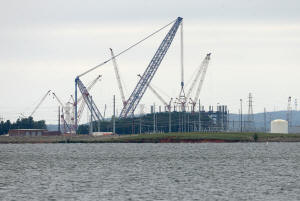South Carolina's state utility says private firm set to restart
abandoned $9 billion nuclear project
[October 25, 2025] By
JEFFREY COLLINS
COLUMBIA, S.C. (AP) South Carolina's state-owned utility is looking to
a private company to revive a project to build two nuclear power plants
that was abandoned eight years ago, losing more than $9 billion without
generating a watt of power.
Santee Cooper's board agreed Friday to start six weeks of negotiations
with Brookfield Asset Management that they hope will lead to a deal that
lets the private company build the nuclear plants at the V.C. Summer
site near Jenkinsville at their own risk to generate power that they
could mostly sell to whom they want, such as energy-gobbling data
centers.
Santee Cooper said Brookfield preliminarily agreed to provide the
utility with some of the power generated. But that and probably
thousands of other details will have to be negotiated. In a twist,
Brookfield took over the assets of Westinghouse Electric Co., which had
to declare bankruptcy because of difficulties building new nuclear
reactors.
Utility officials said the agreement gives hope the state can get
something out of a debacle that led to four executives going to prison
or home confinement for lying to regulators, shareholders, ratepayers
and investigators and left millions of people paying for decades for a
project that never produced electricity.
The risk to the ratepayer is nil. The risk to the taxpayer is nil,
Santee Cooper Board Chairman Peter McCoy said.
There are still too many hurdles for the project to get past to consider
this a win right now, said Tom Clements, executive director of the
nuclear watchdog group Savannah River Site Watch.

After eight years in the elements, all the equipment and the structure
of the plant, which was less than halfway finished, will need to be
carefully inspected before it can be used. The permits to build and the
licenses to operate the nuclear plants will need to be renewed, likely
starting from scratch, Clements said.
I still believe that the cost, technical and regulatory hurdles are too
big to lead to completion of the project, Clements said, adding the
agreement appears to let Brookfield walk away if it decide it's not
feasible.
[to top of second column] |

V.C. Summer Nuclear Station's unit two is shown under construction
near Jenkinsville, S.C., during a media tour of the facility
Wednesday, Sept. 21, 2016. (AP Photo/Chuck Burton)
 Santee Cooper heard from 70 bidders
and received 15 formal proposals to restart construction of the
reactors. Interest in the project has grown as power demand in the
U.S. surges with the increase in data centers as artificial
intelligence technology develops.
Santee Cooper executives credited President Donald Trump's executive
order in May calling for the U.S. to quadruple the amount of power
generated by nuclear plants over the next 25 years for opening the
door to the potential agreement.
You have placed South Carolina in the epicenter of the resurgence
of nuclear power in the United States, Santee Cooper CEO Jimmy
Staton said.
Santee Cooper was the minority partner with what was then South
Carolina Electric and Gas when construction on the two new nuclear
plants started in 2013 at the V.C. Summer site about 25 miles (40
kilometers) northeast of Columbia where SCE&G was already
operating a reactor.
The project needed to be finished in seven years to get tax credits
to keep the project's cost from overwhelming the utilities, but it
ended up behind schedule almost immediately.
Executives lied about the problems to keep money coming in.
Taxpayers and ratepayers ended up on the hook because of a state law
that allowed the utilities to charge for costs before any power was
generated.
Two nuclear reactors built in a similar way in Georgia went $17
billion over budget before they were fully operational in 2023.
All contents © copyright 2025 Associated Press. All rights reserved |